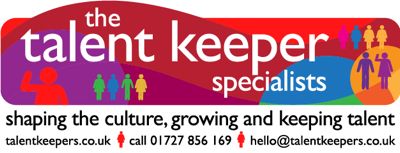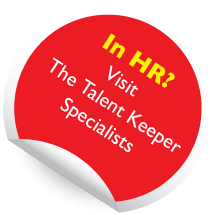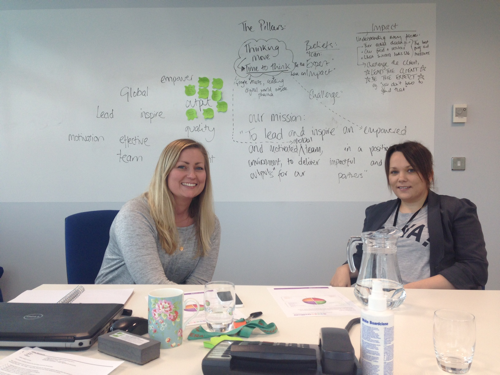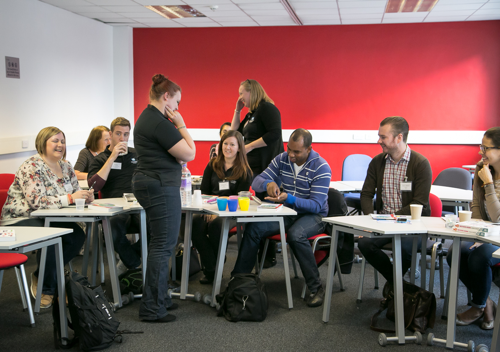Coaching has a positive ripple effect far beyond the person being coached. I often think about the ways in which coachees’ partners, children, clients/customers, direct reports, peers and line managers benefit from the coaching too.
Often coachees talk about the positive impact they believe coaching is having on others; the opportunities opening up because of things they have done as a result of coaching and other people noticing positive changes. This is coaching at its best. It’s also why I nudge coachees to consider opening up a conversation with their line manager/HR team about their coaching being sponsored rather than them self-funding.
Paradoxically, I’ve also known situations where coachees whose employers are funding the coaching, haven’t highlighted to HR or their line managers the role of coaching in them deciding to stretch for a promotion (and being successful) or not to leave their organisation. This has led to a question mark about the return on investment on coaching. Looking from the outside in this is because the individuals haven’t felt able to be open and honest about what they discussed in coaching and how it helped them, for fear of negative repercussions.
I continue to work with many coachees who work in organizational cultures that don’t appear to want to, or know how to make the best of them either before or after coaching. I’ve always seen this as wasteful and began thinking much more about it when setting up The Talent Keepers Specialists in 2012.
One particular conversation with a sparky, forward-thinking Head of Talent about people returning to her business after an extended period of leave (most notably maternity) brought me to the conclusion that any ‘support the individual’ activities have to be in tandem with what we call ‘shape the culture’ activities. For example, at what was then called Veolia Water, we produced a line manager guide to help them support and ramp up the performance of maternity returners before we started to work with individual returners.
The brands you see on the image at the top of the page are all organisations for whom The Talent Keeper Specialists have worked with. Please visit www.talentkeepers.co.uk for more about how we help keep, stretch and fuel returning employees (women and men) and talented and valuable female employees.
“Working with The Talent Keeper Specialists was an easy process from day one.”
 We produced a series of guides to support career returners for the Charted Institute Of Public Relations. Read more about the work we did with the CIPR here. “After providing a comprehensive selection of possible solutions to tackle the challenge a clear structure of planning out the process of creating the guides was delivered, with the team always supplying their work before the deadline.
We produced a series of guides to support career returners for the Charted Institute Of Public Relations. Read more about the work we did with the CIPR here. “After providing a comprehensive selection of possible solutions to tackle the challenge a clear structure of planning out the process of creating the guides was delivered, with the team always supplying their work before the deadline.
Andrew Ross, Public Relations and Policy Manager at the CIPR.
“Something shifted after our conversation and I feel really comfortable about going back to work.”
 Something shifted after our conversation and I feel really comfortable about going back to work. Iʼm the main bread winner and Iʼve got to be comfortable about that but two months ago I was in doubt. It felt really hard. The fact that Iʼd talked to you before having that conversation with (my boss) made a difference. Iʼm clear now that if Iʼm going to leave my baby for 10 hours a day I want to be promoted. Iʼm going to go for it, Iʼm clear about what I want.”
Something shifted after our conversation and I feel really comfortable about going back to work. Iʼm the main bread winner and Iʼve got to be comfortable about that but two months ago I was in doubt. It felt really hard. The fact that Iʼd talked to you before having that conversation with (my boss) made a difference. Iʼm clear now that if Iʼm going to leave my baby for 10 hours a day I want to be promoted. Iʼm going to go for it, Iʼm clear about what I want.”
Coachee at HSBC.
“Helping our people through career transitions such as maternity leave has a positive impact on talent retention, diversity and business performance.”
 We worked with Talent Keeper Specialists to produce a caring and sensible coaching guide for managers to help place Maternity Leavers in the best mind space possible before they go on Maternity leave, and to help them return to peak levels of confidence and performance upon their return.
We worked with Talent Keeper Specialists to produce a caring and sensible coaching guide for managers to help place Maternity Leavers in the best mind space possible before they go on Maternity leave, and to help them return to peak levels of confidence and performance upon their return.
Alina Sandell, Head of Talent, Veolia Water

The horse's mouth
“Coaching with Jessica has had a huge impact on my personal and professional life. I got in touch with her on the recommendation of a friend and colleague when I was at a crossroads and did not trust my ability to make the right decision. I was unhappy at work, had lost my self-confidence, and was unsure whether to change company, change role, stick it out, or pursue something else entirely.”













